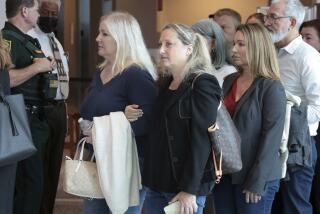Trayvon Martin case: Trial is challenge for prosecution, defense
- Share via
Successfully prosecuting neighborhood watch volunteer George Zimmerman for second-degree murder will require an excruciatingly detailed timeline about the last few minutes of Trayvon Martin’s life -- and finding jurors who haven’t already made up their minds about the highly publicized case.
But first, Zimmerman’s defense team will probably seek a dismissal of the charge under Florida’s now-notorious “stand your ground” law, legal experts say.
Zimmerman is scheduled to make his first court appearance Thursday afternoon. Although most criminal cases end up in some kind of plea agreement, experts predict that Zimmerman’s case will culminate in a jury trial. Key to such a case will be a meticulous recreation of the events leading up to Martin’s death on Feb. 26 in a Sanford, Fla., gated community. Both sides will use those details to suit their purposes.
LIVE CHAT at 11 a.m. Thursday: Trayvon Martin, hoodies and ‘The Talk’
“This case is really going to turn on those last few minutes before the shooting, and what happened,” said USC professor of criminal law Heidi Rummel. The burden of proof for second-degree murder is whether the defendant intended to kill the victim. “And there’s a pretty strong inference that Mr. Zimmerman intended to kill Mr. Martin. But the question is whether he was acting in self-defense, and honestly and reasonably believed that he was in imminent danger of death or seriously bodily harm.”
She added: “The problem in this case is that there are a lot of facts that are in dispute about the moments before the shooting. That is going to be the challenge for the prosecutor.”
University of Florida criminal law professor Kenneth B. Nunn said he believes a lot of deliberation went into the decision to file a second-degree murder charge. First-degree murder would have been a reach -- no one suggests that Zimmerman was intentionally looking for someone to kill, which is the standard of proof with such a charge. But prosecutors also chose not to undercharge the defendant by, say, accusing him of manslaughter.
Nunn predicted that will prove to be a smart legal strategy, especially given the possibility that the case could be presented to jurors who are supporters of Florida’s “stand your ground” law or who are sympathetic to Zimmerman’s plight.
“In a case like this, where you may have jurors who may view Mr. Zimmerman as a sympathetic character, you could run the risk of having a compromised verdict in the case” -- in which the jurors try to come up with a more palatable alternative to the charge in front of them, he said. “If the charge is manslaughter, a jury can only compromise downward from there,” he said.
But if jurors in a second-degree murder case want to show some leniency, they could return a conviction on a manslaughter charge -- a penalty that could give all sides some measure of peace, he said.
Nunn said the case will be an intriguing one to watch in part because many key facts are clear: Zimmerman admits shooting Martin.
At the same time, the devil is in the details -- and trying to determine Zimmerman’s state of mind at the exact moment he pulled the trigger. “That’s not easy to do,” Nunn said, and both sides will try to use that same set of evidence to prove their case.
Nunn said Florida law requires that the prosecution in a second-degree murder case prove that the defendant was guilty of an “act imminently dangerous to another and evincing a depraved mind regardless of human life.” That’s archaic language, he said, for “a form of excessive recklessness.... You have to prove that the defendant was not just guilty of a mere reckless killing, but that it was super reckless.”
And to prove that, jurors will have to believe that the 28-year-old Zimmerman, who was armed with a 9-millimeter weapon, was not afraid that the 17-year-old was going to kill him first.
Nationally, the vast majority of criminal cases end up in some sort of plea agreement. But legal experts on Wednesday predicted that this case would go to trial.
“I’m not sure [special prosecutor Angela] Corey is going to bargain this case,” Nunn said. “Why would she? There’s no reason.”
Of course, a trial means impaneling a jury of men and women who haven’t already made up their minds in the heavily covered case. “It’s going to be hard to find someone who hasn’t heard about Trayvon Martin and George Zimmerman,” Nunn said.
ALSO:
Delivering the space shuttles -- it’s tougher than you think
10 Most Wanted Fugitives: FBI adds alleged child pornographer
New Keystone XL pipeline route? Nebraska Legislature moves ahead
Join Rene Lynch on Google+, Facebook or Twitter
More to Read
Sign up for Essential California
The most important California stories and recommendations in your inbox every morning.
You may occasionally receive promotional content from the Los Angeles Times.











